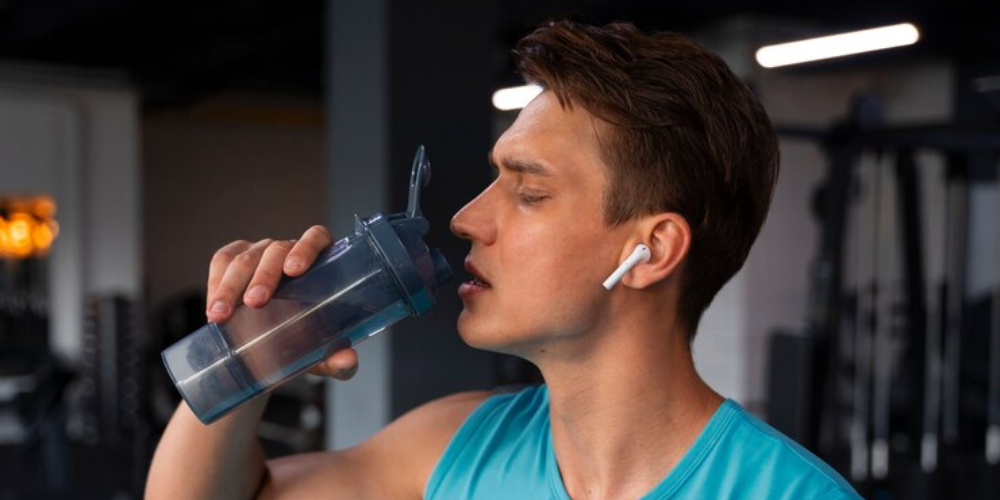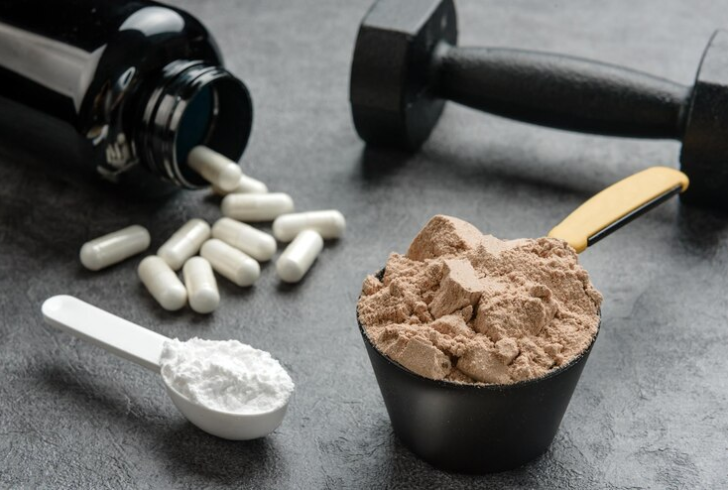
How Much Water Should I Drink on Creatine? Hydration Tips

Creatine, a popular supplement among athletes and fitness enthusiasts, has gained widespread recognition for its ability to enhance muscle strength, power, and endurance. However, one of the most common questions regarding creatine is how much water should I drink on creatine?
Understanding the intricate relationship between creatine and water intake is essential to unlock the full potential of this supplement. Neglecting proper hydration can not only diminish the effectiveness of creatine but also lead to undesirable side effects.
How Much Water Should I Drink on Creatine? Determining Your Needs

Freepik | user18710792 | Creatine supplements come in powder or capsule form, typically as creatine monohydrate.
So how much water should i drink on creatine? The amount of water you need to consume while taking creatine supplements varies depending on several factors, including your body weight, activity level, and the specific dosage of creatine. As a general guideline, experts recommend consuming at least 8 ounces (240 ml) of water with each creatine dose.
However, this is just the beginning. To ensure optimal hydration levels, you should aim for a daily water intake that accounts for your overall fluid requirements. A simple rule of thumb is to drink half your body weight in ounces of water each day. For instance, if you weigh 160 pounds (72.6 kg), your daily water intake should be around 80 ounces (2.4 liters).
It’s important to note that this recommendation serves as a baseline, and your individual needs may vary. If you engage in intense physical activity or live in a hot and humid climate, your water requirements will likely be higher. Additionally, factors such as age, health conditions, and medication use can influence your hydration needs.
The Creatine Loading Phase: Hydration is Key
For those seeking rapid results, the creatine loading phase is a common practice. During this phase, you consume a higher dosage of creatine, typically 20-25 grams per day, for the first 5-7 days, divided into four or five smaller doses. This loading period aims to saturate your muscles with creatine quickly, priming them for enhanced performance.
However, it’s crucial to recognize that the creatine loading phase places an even greater demand on your body’s hydration levels. Each 5-gram dose of creatine should be accompanied by at least 8 ounces (240 ml) of water, meaning you’ll need to consume an additional 32-40 ounces (0.9-1.2 liters) of water per day during the loading phase.
Failing to meet these increased hydration needs can lead to undesirable side effects, such as muscle cramps, bloating, and digestive issues. Furthermore, inadequate hydration may hinder the effectiveness of the loading process, ultimately diminishing the potential gains you could achieve.
Monitoring Your Hydration Status

Freepik | tuiphotoengineer | Consider your daily hydration needs alongside creatine dosage.
Maintaining proper hydration levels while taking creatine requires more than just drinking water; it also involves monitoring your body’s hydration status. Here are some signs to watch out for that may indicate you need to increase your water intake:
- Dark yellow or amber-colored urine: Well-hydrated individuals typically have pale yellow or almost clear urine.
- Muscle cramps or spasms: Dehydration can contribute to muscle cramps and spasms, especially during physical activity.
- Fatigue or lethargy: Inadequate hydration can lead to feelings of tiredness and lack of energy.
- Dry mouth or excessive thirst: These are clear indicators that your body needs more fluids.
By staying attuned to these signals, you can make adjustments to your water intake and ensure that your body is receiving the hydration it needs to support the benefits of creatine supplementation.
Enhancing Creatine Absorption with Proper Hydration
In addition to supporting the transportation and utilization of creatine within your muscles, proper hydration can also enhance the absorption of this supplement. When you consume creatine with an adequate amount of water, it aids in the dissolution and distribution of the supplement throughout your body.
Conversely, if you take creatine without sufficient water, the supplement may not dissolve properly, potentially leading to reduced absorption and diminished effectiveness. This is particularly important when taking creatine in powder form, as the powder needs to dissolve completely before it can be absorbed by your body.
Managing Potential Side Effects with Hydration

Freepik | jcomp | Creatine may cause mild side effects like weight gain, bloating, or digestive discomfort in some individuals.
While creatine is generally considered safe for most healthy individuals, some may experience mild side effects, such as weight gain, bloating, or digestive discomfort. Fortunately, proper hydration can help mitigate these unwanted effects.
The weight gain associated with creatine supplementation is often temporary and primarily due to an increase in water retention within the muscles. By maintaining adequate hydration levels, you can help your body better manage this water retention, reducing the likelihood of excessive bloating or discomfort.
Additionally, staying well-hydrated can also aid in minimizing digestive issues that some individuals may experience when taking creatine. Adequate water intake can help soften stools and alleviate constipation, which can be a potential side effect of creatine supplementation.
Maximize Your Creatine Benefits with Proper Hydration
Creatine has proven its worth as a powerful supplement for enhancing athletic performance and promoting muscle growth. However, without proper hydration, its effectiveness can be compromised, and the risk of side effects increases.
By understanding how much water should i drink on creatine and the intricate relationship between creatine and water, you can ensure that your body is optimally hydrated to fully leverage the benefits of this supplement. Remember, staying hydrated is not just about drinking water with each creatine dose; it’s about maintaining a consistent and adequate overall daily water intake.
More in Nutrition & Weight Loss
-
`
Why Did Chris Pratt Call Anna Faris Before Proposing to Katherine?
Chris Pratt, the beloved star of “Guardians of the Galaxy,” made headlines when he revealed that he called his ex-wife, Anna...
December 3, 2024 -
`
6 Proven Tips to Tackle Insurance Claim Denials Successfully
Claim denials are a common hurdle for healthcare providers and professionals, even for those who follow the necessary procedures to avoid...
December 1, 2024 -
`
5 ‘Bad’ Fitness TikTok Trends You Shouldn’t Follow
TikTok has become a haven for creative fitness advice. But not all trends are worth your time or your health. From...
November 23, 2024 -
`
Does Drinking Water Affect Adrenal Hormones?
Drinking water is often seen as a simple way to stay hydrated, but it has deeper effects on our body than...
November 14, 2024 -
`
Why We Feel the Loss of Celebrities So Deeply?
Celebrity grief might sound strange at first. After all, most of us have never met these famous figures in person, yet...
November 5, 2024 -
`
Are High Deductible Insurance Plans as Ideal as They Appear to Be?
High deductible insurance plans have been a hot topic for years, especially as healthcare costs continue to rise. For many Americans,...
October 31, 2024 -
`
How Training Load Data Can Transform Your Exercise Routine
Tracking progress during workouts is challenging. Simple metrics like mileage or time don’t show the whole picture. Understanding the overall effort...
October 26, 2024 -
`
Katy Perry’s Weight Loss Journey: Secret Diet Tips Revealed
Katy Perry’s weight loss journey has been making headlines, with the pop star shedding 20 pounds over the past few months....
October 16, 2024 -
`
Celebrity Trainer Jeanette Jenkins Shares 5 Key Workout Motivations
Jeanette Jenkins is one of the most sought-after celebrity trainers, known for her ability to motivate and inspire people to achieve...
October 8, 2024















You must be logged in to post a comment Login